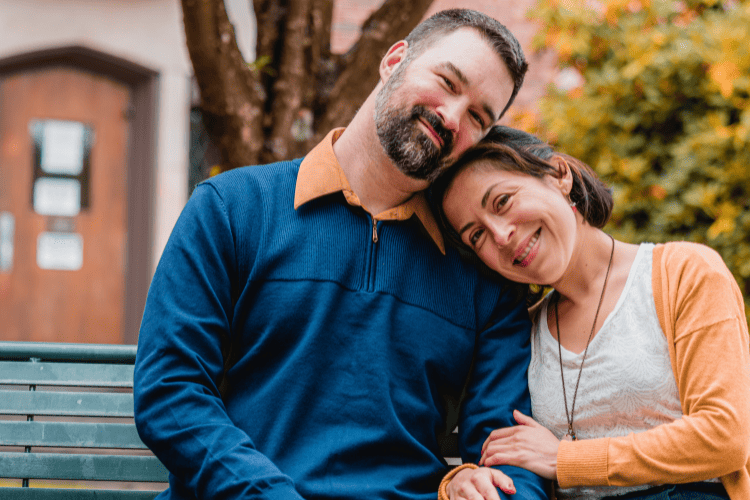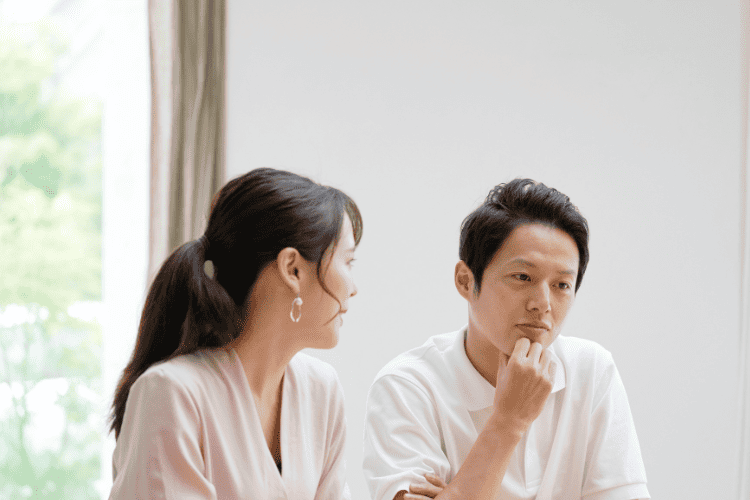Last Updated on September 20, 2023 by Angela Vaz
I was always the type that knew what I wanted when I saw it.
I never believed in taking it slow.
And yes, I wore my heart on my sleeve.
If I found a nice guy – why wait?
What even is the purpose of going slow?
I’ve had bad relationships that started out beautifully but ended in devastation and cheating. I’ve been single for a long time and dated till I found a partner who loves and respects me for who I am.
And yes, we went really slow.
I explain in this post what to do if your partner wants to go slow and you have no clue what that means.
There are benefits of not moving too fast – the connection we form is even deeper, and the best part is that nothing will take you by surprise because both of you are slowly getting to know one another.
This will help love bloom and let things unfold in their own place.
Let’s look at how to not move too fast in a relationship.
This post contains affiliate links, meaning I may make a commission at no extra cost to you if you decide to click on a link and purchase something. Click here to read the full disclaimer.
How do you date someone without moving too fast?
1. Become comfortable with talking

No relationship can thrive without communication.
Both of you must become comfortable expressing your thoughts, feelings, and expectations early in the relationship.
For instance, both my partner and I discussed our lifestyles in the first couple of dates.
We both didn’t want kids but loved animals and wanted to center our lives around them.
Please know that there is no wrong desire or need.
When you openly communicate your desires and concerns, there is less room for misunderstandings.
That way, if your partner is compatible with you, you’ll know early on, and it’s a good thing.
You can also set and discuss boundaries in your relationship, creating a sense of safety and respect.
In the early months, my partner had very hectic work hours, and other than squeezing a few texts, we couldn’t communicate as often.
But that was okay because he briefed me about everything!
Talk openly about your expectations and listen to each other’s goals.
This will help you align your goals and prevent one person from feeling rushed or pressured.
2. Take time to get to know one another

You are in this for the long haul.
I’m pretty sure your partner is also looking for a long-term relationship, so take all the time you want to get to know one another.
Get creative – meet for coffee, take a walk in the park, or do a fun activity together. Here are some ideas for spontaneous dates you might like.
Understand that everyone is unique, with their own values, beliefs, quirks, and personality traits.
So, take some time to get to know all of these.
It’s okay if your dreams and goals aren’t the same as your partner’s, but you both need to decide if that’s okay.
For instance, my partner loves data consulting, while I love writing and drawing.
Although our goals differ, we still have the same goal of traveling the world and being very independent, so they’re aligned.
By getting to know your partner, you’ll know what makes them tick, what they’re passionate about, and what they find important in life.
3. Learn about past experiences

Your partner needs to be okay with your past and vice versa.
I had this problem with my ex.
He initially told me he was okay with my past, but within a few weeks, I could see him getting uncomfortable with the fact that I was a divorcee.
He was obviously religious, and I only found out during our breakup that he couldn’t pursue a relationship with someone who had already been married before.
So, get this all out of the way in the beginning.
Understand that you cannot change your partner’s past – and knowing about it will help you understand their fears, past successes, and failures.
This knowledge can help you develop empathy and build a deeper emotional connection with your partner.
Look at this as an opportunity to get closer to your partner.
4. Discuss future goals

It’s so important for both of you to have similar goals and values.
This is what helps you decide whether you are compatible or not.
My partner wants to pursue his Ph.D., and I want to start a stationery business; we’ve already discussed our plans for the next few years and are so excited to get the ball moving.
Both my partner and I love animals, and we plan to travel until we are too old to keep moving and eventually settle down on a farm where we can raise animals and love them.
You must discuss short-term and long-term goals like career ambitions, family plans, and personal growth.
This will help both of you align your future goals and build a relationship together with a shared vision.
5. Understand their communication style

Because you’re not moving too fast in this relationship, you’ll have to learn so many things about your partner.
People have very different ways of expressing themselves and communicating.
Some people may be more reserved, while others are very outgoing.
My partner loves to swim or jog when he needs to clear his head – I love to talk and get it all out of my system.
I would be very puzzled when my partner would ask me to jog with him when I was upset.
Once we understood how each other works, we started becoming more understanding.
Getting to know each other will help you both navigate challenges and work together as a team.
You’ll learn how to handle adversity, solve problems, and support each other during difficult times.
This will depend on the emotional connection you both build.
6. Prioritize self-care

My problem in my previous relationships was that I never took time for myself.
I used to assume that relationships meant they were all about giving and never receiving.
This led to me attracting very needy and insecure partners because I never knew how to draw healthy boundaries.
This also meant that I developed a weird savior complex and always felt I needed to save my partner.
Self-care is important for both you and your partner.
Self-care means practicing little behaviors to promote your physical, mental, and emotional well-being.
This could mean:
- Continuing to work on your hobbies and passions: Just because you’re in a relationship doesn’t mean you must stop playing tennis, drawing, or swimming.
- Working on your emotional health: Discuss things with your partner, but do not make them your therapist. Continue to journal, meditate, or walk to improve your mental health.
- Avoiding co-dependency: Your partner and you need not spend 24 hours together daily. That isn’t healthy. Your happiness should not depend entirely on each other – this will strain the relationship.
- Respect each other’s boundaries: When your partner has work to attend to or has to attend a family emergency, be supportive and understanding. It helps that both of you talk to each other about these.
- Balancing your priorities: Life has various responsibilities like work, family, and relationships. Make sure that both of you allocate time and energy to these.
When you take care of yourself physically, emotionally, and mentally, you’ll be able to be a better partner and give your all in the relationship.
Taking care of yourself is not selfish – but essential for the health and longevity of the relationship.
7. Don’t rush intimacy

Let the relationship take its own course.
Taking it slow means taking the time to develop an emotional connection before becoming intimate.
Taking it slow will build trust and vulnerability and establish a strong emotional bond.
This will also help you both trust each other more over time, and you and your partner will feel safe and respected – reducing the risk of emotional wounds or misunderstandings.
Everyone has different comfort levels and boundaries when it comes to physical intimacy.
So use this time to discuss them.
And intimacy is not just about physical closeness – it’s also about intellection and emotional connection.
So, by slowing down, you both explore each other’s thoughts, dreams, and values.
By taking it slow, you are alleviating this pressure and expectation of becoming physically intimate, and both of you can relax and enjoy the process without feeling rushed.
8. Do not neglect red flags

Red flags can be early indicators of more serious problems that will arise in the future.
So, if you note something, pay attention to it now rather than later.
Trust your gut. Don’t ignore those warnings When your gut tells you something is wrong and you’re uncomfortable.
Stand up for your values, and don’t tolerate behavior that goes against your values.
When my first ex would get upset over me talking to people, I initially thought he was being possessive, and I assumed it was a good thing.
It wasn’t.
That behavior soon became abusive, and I wish I’d noticed that glaring red flag.
Examples of red flags in a relationship can include:
- Controlling or manipulative behavior.
- Frequent, intense arguments or conflicts.
- Disrespectful or abusive language.
- Unresolved past issues or trauma.
- Refusal to communicate or share emotions.
- Dishonesty or inconsistency in words and actions.
- Lack of empathy or disregard for your feelings
9. Balance passion with reason

In a romantic relationship, this means balancing intense emotions, excitement and desires with practical, logical aspects of the relationship.
Passion is what draws most people into relationships – this is that exhilarating feeling of being in love. But this can often lead to impulsive decisions and clouded judgment.
Taking it slow actually combats this.
When you both talk about finances, careers, or family planning, you both are making a stable and secure future together.
While passion can lead to intense emotions during arguments and conflicts, reason will help you both find solutions and compromise.
That is why it’s so important for both of you to set respectful boundaries with each other.
This way, you both love each other but at the same time maintain your independence and self-respect.
I also always stress compatibility.
It’s important to see whether you have similar values, goals, and lifestyles.
This will help you both determine if your relationship has the potential to withstand the test of time.
10. Create relationship milestones

Relationship milestones are significant events that mark the progress and growth of a romantic relationship.
These can be both small and large – they’re so much fun!
They give you a reason to celebrate your love and commitment to each other and this strengthens that emotional bond.
It’s such a lovely way to build memories and deepen your connection.
You’ll have stories and moments to reflect upon with each other or with friends and family.
And more importantly, it reinforces your comment to each other.
Some examples of relationship milestones are:
- Your first date, where you met, what you did together
- The first time you both said “I love you”
- Monthly anniversaries or weekly for the first few months
- Moving in together
- Meeting each other’s family and friends – some funny moments
- Celebrating your first year together
- Getting engaged or married
- Buying a pet together
- Buying a home together
- Starting a family
- Achieving certain personal goals together
You can create many more relationship milestones – and of course, you can tailor them to your own relationship.
What matters most is how you reflect on them.
Just remember that the pace at which you reach those milestones should align with your partner’s comfort levels, too!
11. Be patient

If you’re not used to going slow, then this can take some time getting used to.
So you’ll need to be patient.
Stop listening to society and its rules that dictate what is the norm for how a relationship should progress.
People find love at all ages – there is no rule that both of you must fall in love and get married by 30.
That’s nonsense.
Let things unfold at their own pace – remember, this will help build a strong foundation for the relationship.
Each person has their own experiences, fears, and emotional baggage, so take time to respect that and try not to judge or pressure them.
Trust takes time to build.
It took me a whole year to build trust with my partner – I took it very slowly because I had rushed before with my exes, and I didn’t like how those relationships unfolded.
Know that love is a journey – you cannot rush it.
Enjoy each step along the way – trust me, it will be a more beautiful experience.
Here are a few more posts that will help:
- 13 true signs he loves you even after a fight
- 15 clear signs the talking stage is going well
- The real reason why your boyfriend never gets jealous
- 13 devastating things you should not forgive in a relationship
- 7 easy ways to be more bold in a relationship
- My boyfriend is not my type physically, what to do?
- No one compares to your ex, what to do?




2 Comments
I was in LDR before moving in with my then BF, we learned how to be patient , so I totally agree with your last point. Being patient means also to have a faith in the process and it will workout eventually.
I’m glad you agree Amira and good luck to you and your boyfriend – wishing you both a lifetime of love and happiness!
Warm regards,
Angela